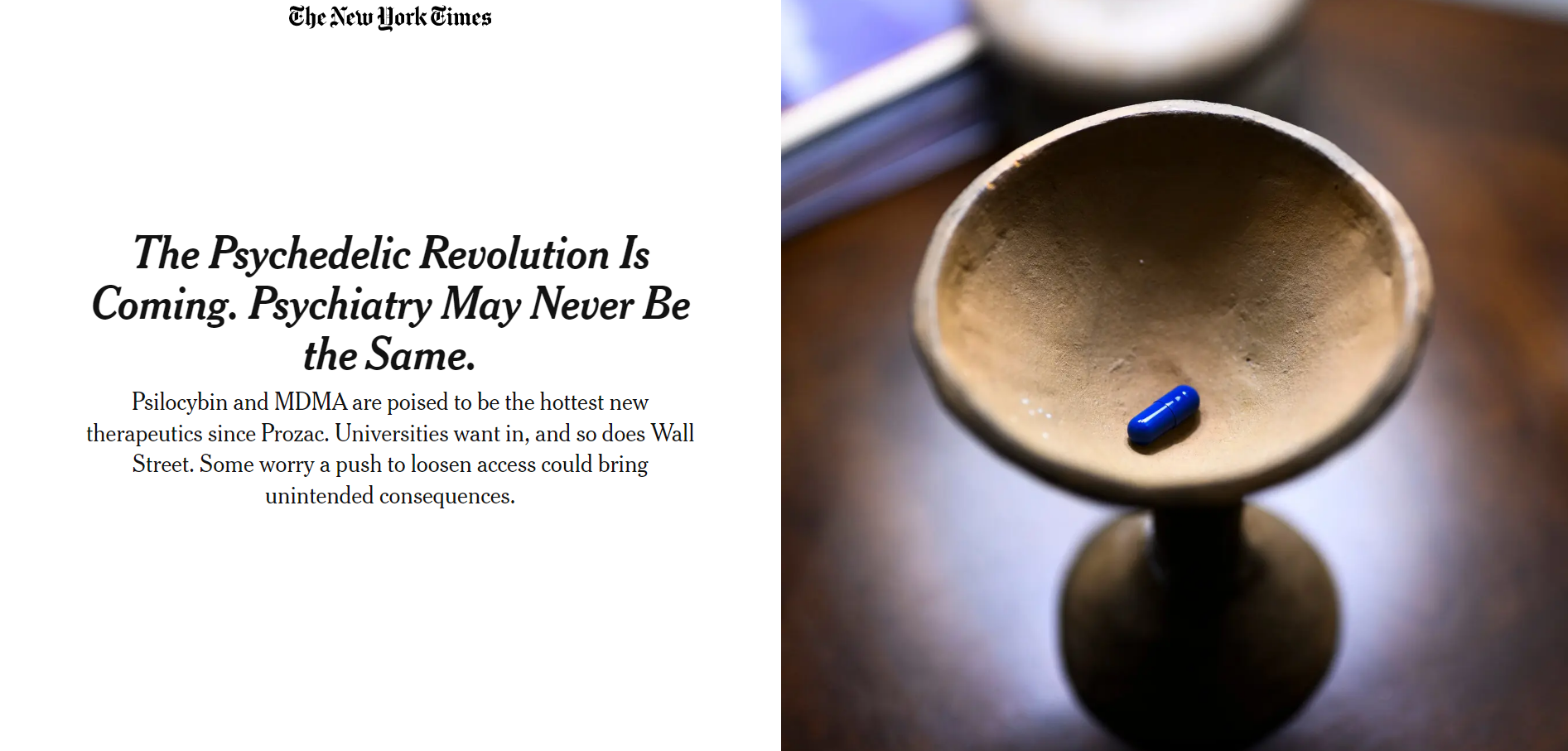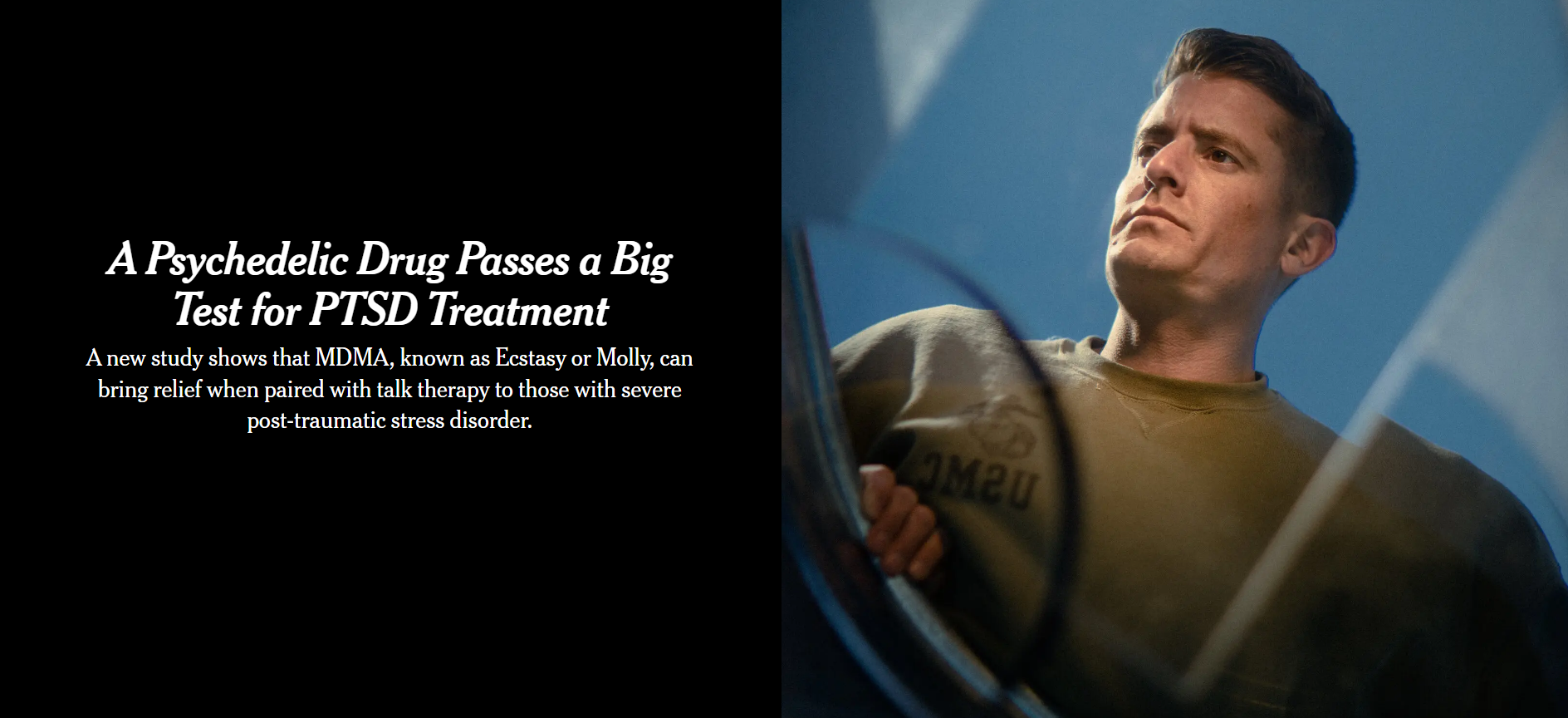By Gabriel García October 10, 2022
The Psychedelic Renaissance is in full swing. Every few weeks we hear in national and international media about new studies, scientific advances and political debates and measures to legalize or decriminalize its use. But when did the clinical use of psychedelics begin to permeate mainstream culture? Was it through the media, or did it come from elsewhere? In this article we are going to analyze it.
1. Psychedelics may be the future

The psychedelic revolution is coming. Psychiatry may never be the same again.
Psilocybin and MDMA are about to become the hottest new therapies since Prozac. Universities want in, as does Wall Street. Some worry that pressure to liberalize access could have unintended consequences. Psilocybin and MDMA are about to become the hottest new therapies since Prozac.
https://www.nytimes.com/2021/05/09/health/psychedelics-mdma-psilocybin-molly-mental-health.html
This will change your mind about psychedelic drugs.
For years, the mental health field has been largely devoid of significant treatment breakthroughs. But now, scientists have new hope in the least likely place: psychedelic drugs. Recent research suggests that certain psychedelic substances may help relieve anxiety, depression, PTSD, addiction and fear surrounding a terminal diagnosis.
https://time.com/5278036/michael-pollan-psychedelic-drugs/
This latest news, more than four years ago now, puts us in precedent on the media blitz that had already been timidly incubating a few years earlier. TIME magazine and the New York Times published two headlines full of intention: a change in the game board is beginning to take shape, psychedelics are back from the past and seem to be the future.
If we read some of these articles in their entirety, we see that, although psychedelics are discussed, it is done in a more generalized way, sharing the attention with the particulars of this vision and what it implies in a few brush strokes.
Appearing in many of these articles, moreover, is Michael Pollan, another of those responsible for this inclusion of psychedelics in the collective imagination with his book ‘How to Change Your Mind’ (from which Netflix released a few months ago a series of documentaries), which was an absolute best seller in U.S. territory.
Once this generalized vision of psychedelics was established, the next phase would begin:
2. The promise of psychedelics is fulfilled.
Psilocybin therapy dramatically reduces excessive alcohol consumption, small study finds
Researchers say psilocybin therapy dramatically reduces excessive alcohol consumption, small study finds. Researchers say the results are promising for the millions of Americans who suffer from alcohol use disorders.
https://www.nytimes.com/2022/08/25/health/psilocybin-mushrooms-alcohol-addiction.html
How ecstasy and psilocybin are shaking up psychiatry.
Regulators will soon wrestle with the safe administration of potent psychedelics to treat depression and post-traumatic stress disorder.
https://www.nature.com/articles/d41586-021-00187-9
Can MDMA save a marriage?
For some couples on the brink of divorce, taking the illegal psychedelic drug was a last resort - but it ended up being the only thing that worked.
https://www.nytimes.com/2022/02/08/well/mind/marriage-molly-mdma.html
A symptomatic change between the headline of this latest article and the first article cited a few paragraphs back is that “the revolution is no longer coming.” On this occasion, the revolution is already here. From the futuristic we move to the facts, to the present. Headlines such as the New York Times psilocybin headline begin to intermittently fill sections of the newspapers, and the bombardment is constant for many years.
It’s not just “psychedelics” anymore; it’s magic mushrooms, MDMA and ecstasy. Proper names for specific purposes: depression, post-traumatic stress disorder, alcoholism. And the list goes on and on until, inevitably, over the years we reach the point where we are today:
3. Psychedelics are here to stay

Alberta will be the first Canadian province to regulate psychedelics for therapeutic use.
Alberta will be the first Canadian province to regulate psychedelic drugs for therapeutic use, government officials announced Wednesday. Under the plan, the provincial government will regulate the psychedelic drugs psilocybin, psilocin, MDMA, LSD, mescaline, DMT, 5 methoxy DMT and ketamine as a treatment for psychiatric disorders.
San Francisco supervisors unanimously approve decriminalizing psychedelics.
The San Francisco Board of Supervisors unanimously approved a resolution at its meeting Tuesday to decriminalize psychedelics such as psilocybin mushrooms and ayahuasca. Sponsored by Supervisors Dean Preston and Hillary Ronen, the measure calls for police to consider entheogenic plants as “one of the lowest priorities” for penalties, and requests that the city’s criminal justice resources not be spent on individuals who use psychedelics. The resolution also advocates for decriminalization of entheogenic plant practices at the state and federal levels.
https://www.cbsnews.com/sanfrancisco/news/san-francisco-supes-decriminalize-psychedelics-mushrooms/
Less than a month ago we could read these two headlines: Canada regulates at the provincial level the use of psychedelics for therapeutic purposes, and San Francisco decriminalizes the use of psychedelics (if you want to know more about the latter, we already dedicated an article to it on the web.
These two recent victories represent a turning point so that the study of the therapeutic purposes of these substances can be extended and applied at the clinical level by experts and professionals. These news are not the only ones, if not the last ones, in a trend that has been generalizing for some time and is now invading the European continent, which is beginning to become more familiar.
The last chapter included in each of the books in the Psychonaut’s Guide collection deals with the current legal situation of psychedelic substances.If you are interested in learning how these substances can help improve your mental health, you can read more information about psychedelics in the Essential Guide to the Psychedelic Renaissance, by Antón Gómez-Escolar. We also recommend Psychedelics and Mental Health, by Irene de Caso and Your Brain on Psychedelics, by Genís Oña, where you will learn the keys to the effects of psychedelics, capable of producing significant changes in the processes of perception, thought and consciousness. The book also includes a prologue written by one of the greatest eminences in this field, José Carlos Bouso, scientific director of ICEERS.

These books are now available on Amazon in physical and eBook format, as well as Apple Books. In addition, all titles are available in Spanish version on GuiasdelPsiconauta.com




